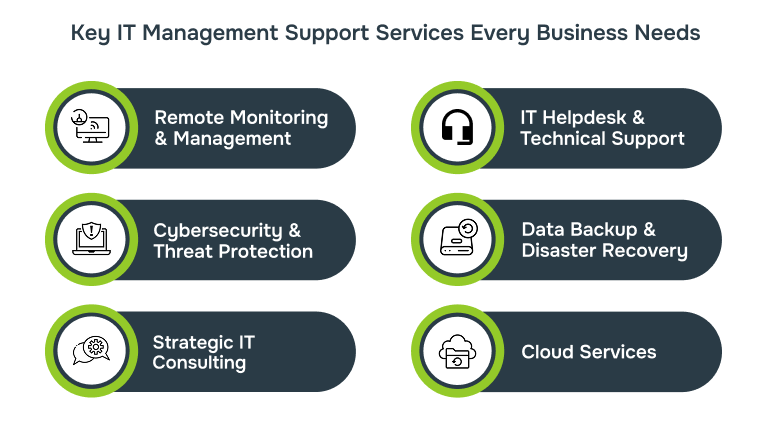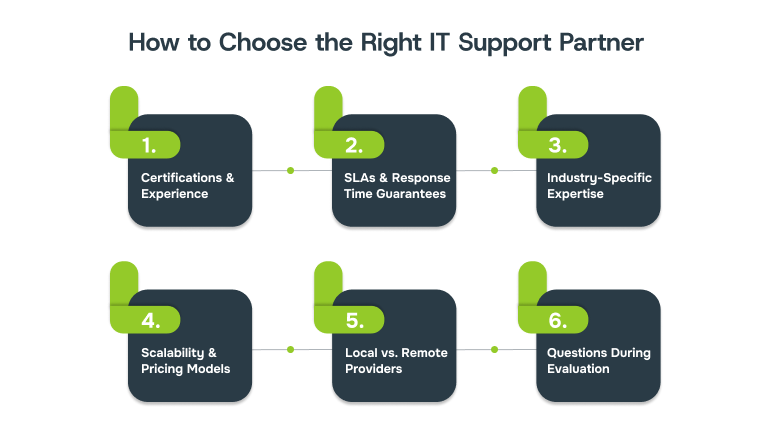Comprehensive Managed IT Support Services for Businesses
Get trusted IT management support services with 24/7 monitoring and expert local team. Ensure seamless operations, call now to schedule a consultation.

Ever had your business grind to a halt because of a single server outage or a security scare? You’re not alone.
A single downtime incident can cost small and medium-sized businesses up to £212,000 on average, with some reporting losses reaching £300,000 per hour. Beyond the immediate financial hit, these events often carry hidden costs, like overtime wages, urgent IT recovery expenses, and missed sales opportunities. That’s a cost you simply can’t ignore.
It’s no wonder that companies are leaning into IT management support services, not just to solve problems, but to prevent them entirely. These services ensure your IT systems are patched, protected, and monitored around the clock, so you’re always a step ahead.
In this blog, we’ll explain what these vital services include, explore how they reduce downtime and risk, and guide you on choosing the right partner to keep your team focused on growth, not glitches.
What Are IT Management Support Services?
IT management support services refer to the day-to-day assistance, systems oversight, and long-term guidance businesses receive to keep their technology running smoothly. Whether it’s fixing a system issue, protecting your data, or updating software across multiple devices, these services are designed to keep your operations uninterrupted and secure.
Unlike reactive in-house IT teams, businesses that opt for managed IT support services benefit from a proactive approach. This means having a dedicated team that not only monitors your systems 24/7 but also plans ahead to prevent disruptions and align your technology with your business goals.
In-House vs. Managed IT Support: A Quick Look
| Criteria | In-House IT Team | Managed IT Support Services |
| Cost | High (salaries, tools, training) | Predictable monthly fee |
| Availability | Business hours only (usually) | 24/7 monitoring and support |
| Expertise | Limited to the internal team’s skills | Access to a wider talent pool |
| Scalability | Harder to scale quickly | Easily scales with business needs |
| Risk Management | Reactive in many cases | Proactive and preventive approach |
Now that we’ve covered what IT management support services involve, let’s look at why they’ve become a critical investment for businesses navigating today’s fast-moving digital landscape.
Why Do Businesses Need IT Management Support?
As businesses grow, so do their technology needs, and so does the complexity of keeping everything running safely and smoothly. From managing cloud-based applications to securing remote work environments, the IT demands of modern operations are far beyond what a small internal team or one-size-fits-all software can handle alone.
- Growing IT Complexity: As businesses expand, their technology stack becomes more layered. From cloud tools to internal systems, managing everything without structured support leads to performance issues and inefficiencies.
- Risk of Downtime and Productivity Loss: Without dependable IT support, even minor issues can halt operations. System crashes, outages, or failed updates delay teams and affect customer service and revenue.
- Increased Cybersecurity Threats: Cyber threats like phishing, ransomware, and breaches are on the rise. Without proper monitoring and regular updates, businesses remain exposed. IT support adds a layer of proactive protection.
- Data Loss and Backup Gaps: System failures or errors can lead to data loss. For businesses handling sensitive or financial data, this is a serious risk. Managed IT ensures regular backups and reliable recovery.
- Compliance and Regulatory Pressure: Industries like healthcare and finance must meet strict compliance standards. Falling short invites legal issues. IT support helps keep systems secure and aligned with regulations.
- Proactive vs. Reactive Support: Fixing problems after they occur leads to higher costs and longer downtime. Proactive IT support identifies and resolves potential issues early, keeping systems stable and efficient.
- Heavy Dependence on IT Systems: Modern businesses run on tech, from communication to customer service. In 2024, the average cost of a data breach in the United Kingdom was estimated at approximately 4.53 million U.S. dollars, proving how vital reliable IT support is.
Understanding the risks and rising IT demands is only one side of the story. Let’s now explore what’s actually included in modern IT support, and which services businesses rely on the most.
Key IT Management Support Services Every Business Needs

Managed IT support isn’t just one service; it’s a combination of tools, people, and strategies designed to keep your business running efficiently and securely. Below are the most common services provided under a managed IT agreement:
1. Remote Monitoring & Management (RMM)
RMM tools give businesses around-the-clock visibility into their IT infrastructure. They help prevent issues before they disrupt daily operations, making it a foundational part of any managed service.
- 24/7 System Monitoring
Tracks the health and performance of networks, servers, and endpoints in real time. - Proactive Issue Resolution
Fixes potential problems early, often before users are even affected. - Automated Maintenance
Handles patch updates, security scans, and system cleanups in the background. - Asset Management
Keeps track of all hardware and software, helping teams stay organised and compliant.
2. IT Helpdesk & Technical Support
This is the go-to resource for employees when they run into everyday tech issues. Helpdesk support improves productivity by keeping response times short and frustrations minimal.
- User Support for Common Issues
Solves login failures, app crashes, printer errors, and other frequent tech roadblocks. - Multi-Channel Availability
Offers help through chat, email, phone, or a ticketing system based on user preference. - Tiered Support Levels
Escalates issues to senior IT staff when frontline support can’t resolve them. - Fast Response Times
Ensures minimal downtime and keeps business activities running efficiently.
3. Cybersecurity & Threat Protection
Cybersecurity isn’t a “nice-to-have” anymore; it’s a business necessity. Managed IT services include multiple layers of protection to guard your data and systems from threats.
- Firewall and Intrusion Prevention
Blocks unauthorised access and keeps malicious traffic at bay. - Endpoint Protection
Secures every device connected to your network, from desktops to mobile phones. - Email Security
Filters phishing emails, malware, and spam before they reach your team’s inbox. - Security Audits and Compliance
Identifies vulnerabilities and ensures alignment with industry-specific regulations. - Incident Response
Activates rapid containment and recovery protocols if a breach occurs.
4. Data Backup & Disaster Recovery
Reliable backup and recovery isn’t just about preventing data loss; it’s about business continuity. When systems crash, a quick bounce-back protects revenue and trust.
- Automated Backups
Regularly backs up data to secure on-site or cloud storage without manual intervention. - Version Control and Retention
Allows rollbacks to previous file versions if data gets deleted or corrupted. - Disaster Recovery Planning (DRP)
Lays out how to recover quickly from events like hardware failure, fire, or cyberattack. - Business Continuity Support
Ensures essential operations can continue even during unexpected outages.
5. Strategic IT Consulting & Planning
Beyond day-to-day support, managed IT services also provide expert guidance on how technology can support business goals. This forward-thinking approach saves costs and boosts scalability.
- Technology Assessments
Audits current systems and identifies opportunities for improvement or consolidation. - IT Budgeting & Roadmaps
Helps forecast future IT needs and spending for smarter financial planning. - Cloud Strategy & Migration
Guides your move to cloud platforms like Microsoft 365 or AWS for greater flexibility. - Vendor Management
Coordinates with software and hardware vendors, handling renewals and troubleshooting. - Compliance Readiness
Ensures systems meet data protection and security standards across industries.
6. Cloud Services
Cloud-based tools have become the backbone of modern operations, especially for small and medium businesses. Forbes recently noted that over half of SMBs use five or more cloud apps, a clear sign that cloud adoption is no longer optional, but central to staying agile and connected.
- Cloud Storage & Collaboration Tools
Platforms like OneDrive, Google Drive, and Dropbox enable seamless file sharing and real-time teamwork. - Cloud Infrastructure Management
Includes services like AWS, Microsoft Azure, or private cloud hosting, managed and optimised for your use. - Cloud Security & Access Controls
Ensures only authorised users access your cloud resources, with secure login protocols. - Cloud App Integration & Support
Helps unify your tools, from CRM and accounting software to project management platforms, into one streamlined ecosystem.
Now that we’ve explored the core IT support services businesses rely on, the next question is: how do these services actually impact day-to-day operations? Let’s look at how IT management support contributes to real, measurable improvements across the business.
How IT Support Services Improve Business Operations
Efficient IT support doesn’t just fix tech issues; it plays a vital role in streamlining operations, reducing internal pressure, and supporting long-term growth. Here’s how these services make a difference across teams and departments:
- Boosts Productivity by Reducing DowntimeFrequent tech disruptions erode productivity: research shows that small businesses lose nearly 98 work hours per year—equivalent to 12 full working days—due to tech failures like slow internet or faulty devices. With a proactive IT support handling system monitoring and maintenance, companies can significantly reduce these losses.Example: A mid-sized accounting firm experienced 1–2 hours of downtime weekly from server issues. After outsourcing IT support, their outages were resolved quickly, saving an estimated $390,000–$780,000 in annual billable hours, plus hundreds of thousands in wages for unproductive time.Lowers IT Stress for Non-Tech TeamsWhen non-technical staff aren’t burdened with fixing devices or software glitches, they can remain focused on core tasks. This lowers stress and improves morale—tech failures impact something 42% of business owners say.Example: A creative agency’s team was frequently sidetracked by patchy printing and application crashes. Once IT helpdesk support was implemented, they reported smoother workflows and a significant drop in support-related interruptions.Frees Up Internal Resources for Strategic WorkInstead of dedicating internal resources to reactive IT management, businesses can redirect their focus toward strategic objectives.Example: A 20-person marketing agency spent half its budget on reactive IT maintenance and lost key staff hours on firefighting. Switching to managed IT support halved their IT costs and freed up staff to focus on customer growth and marketing campaigns Keeps Your Business CompliantRegular IT audits, updates, and secure data practices aren’t just helpful—they’re essential for compliance. Frequent service interruptions can trigger compliance failures and financial penalties, especially in regulated sectors.Example: A regional healthcare provider worked with an IT support team that implemented network-wide security measures, endpoint protection, and continuous compliance checks. Within months, they achieved 98% fewer security incidents and 100% HIPAA compliance, while reducing IT-related downtime by 30%.
While understanding the benefits of IT support is important, choosing the right provider is what truly determines how well your business can take advantage of those services.
Why It’s Important to Choose the Right Support Partner?
Not all IT support providers offer the same level of service, and that difference can directly affect your business performance. Choosing the wrong partner could mean slower response times, unclear pricing, generic solutions, and limited long-term value.
Here’s why getting it right matters:
- They shape your day-to-day experience.
A responsive, proactive support partner keeps your systems running and your team stress-free. A less capable one can leave you waiting during urgent issues or scrambling for backup when systems fail. - They impact long-term business efficiency.
The right partner doesn’t just solve problems—they help you prevent them, plan ahead, and make smarter decisions about tools, security, and scalability. - They protect your data and reputation.
From cyberattacks to compliance breaches, IT risks are real. A reliable support provider builds strong security foundations that protect your business behind the scenes. - They grow with you.
Your tech needs today won’t be the same a year from now. A strong IT support partner scales with your business, helping you adopt new systems, navigate upgrades, and stay competitive.
In short, the right IT partner isn’t just someone who fixes things. They’re an extension of your team—someone who helps your business run smoother, safer, and smarter every day.
Now that we know the importance of choosing the right support partner, let’s see how to choose the right IT support partner.
How to Choose the Right IT Support Partner

Not all IT support providers offer the same level of service. Use this checklist to evaluate whether a partner aligns with your business goals, budget, and tech needs.
1- Certifications and Experience
Look for providers with up-to-date industry certifications (like Microsoft, Cisco, CompTIA) and a proven track record with businesses similar to yours.
2- SLAs and Response Time Guarantees
A good provider should offer clear Service Level Agreements (SLAs), including guaranteed response times, uptime commitments, and support availability.
3- Industry-Specific Expertise
If your business operates in a regulated or niche sector (like healthcare or finance), check whether the provider understands your specific compliance and infrastructure needs.
4- Scalability and Pricing Models
Your IT needs will grow; your provider should offer flexible packages that scale with you. Transparent pricing (with no hidden fees) is also a must.
5- Local vs. Remote Providers
Consider whether on-site support is essential. Local providers may offer faster physical response, while remote providers often bring cost advantages and extended availability.
6- Questions to Ask During Evaluation
- What’s your average response time?
- Do you proactively monitor systems or just respond to issues?
- Can you provide client references in my industry?
How Alberon Supports Your Business With Reliable IT Management Services
At Alberon, we understand that IT systems are the backbone of any modern business. But managing them in-house, especially while scaling, can quickly drain time, budget, and resources. That’s where we step in. Our managed IT support services are designed to keep your systems running smoothly, your teams productive, and your business protected. Here’s how we help:
- Proactive Support That Keeps Downtime at Bay: We don’t just wait for problems to happen. Our team monitors your systems 24/7, identifying issues before they become disruptions. This proactive approach keeps downtime minimal so your employees stay focused and your operations stay uninterrupted.
- Scalable Services That Grow With You: Whether you’re a small business or a scaling enterprise, our services are built to adapt. As your needs evolve, we help you upgrade systems, expand infrastructure, and stay secure without starting from scratch.
- Cybersecurity That’s Built In, Not Bolted On: From firewalls and threat detection to regular audits, we ensure your digital assets are protected. With cyber threats increasing every year, our security-first mindset means your business doesn’t just meet today’s standards but stays ahead of tomorrow’s risks.
- Seamless Integration With Your Existing Tech: Alberon helps connect your IT setup with the tools you already use, whether that’s Microsoft 365, cloud storage, or collaboration platforms. You get a cohesive environment where everything just works together.
- Human Support, Not Just a Ticket Number: Our helpdesk isn’t just for emergencies. From password resets to system hiccups, we offer hands-on, jargon-free support from real people who know your setup. This means issues get resolved quickly and clearly.
- Long-Term Strategy and Guidance: Our role doesn’t end at support. We help you plan your IT roadmap with future-proof infrastructure, tech upgrades, and budget-friendly decisions that align with your business goals.
With Alberon, managed IT support becomes a business advantage, not just a service. We’re here to simplify your systems, reduce tech stress, and free up your time to focus on what matters most: growing your business.
Conclusion
Reliable IT management support has become essential for businesses of all sizes. As systems grow more complex and cybersecurity threats continue to rise, having a dedicated team to monitor, maintain, and guide your IT infrastructure is no longer optional; it’s strategic. Whether it’s reducing downtime, improving compliance, or simply freeing up internal teams to focus on growth, managed IT services offer long-term value that goes beyond immediate fixes.
Choosing the right partner can make all the difference. A provider who understands your business goals, offers scalable services, and prioritises security and support can help build a stronger, more resilient tech environment.
If you’re exploring how managed IT support could work for your organisation, Alberon offers the experience and insight to guide you. Feel free to get in touch to learn more or ask questions.
Get in touch with us to explore how Alberon’s tailored IT support services can keep your systems running smoothly and your business moving forward—securely, efficiently, and without the tech headaches.
Get in Touch Today:
Ready to Improve your Business Productivity
Get a trusted partner to navigate your digital transformation. With Alberon, you can ensure a smooth transition, clear communication, and peace of mind.
